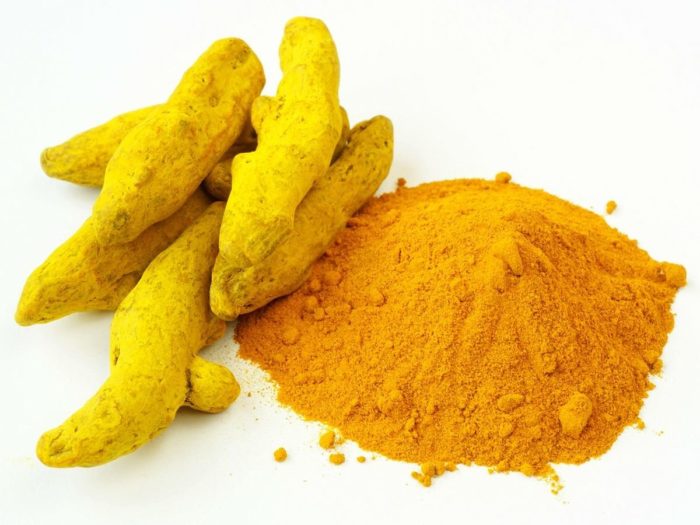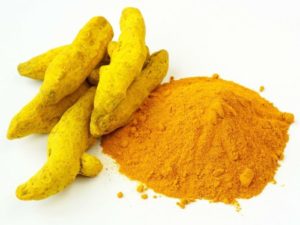
TURMERIC OIL
Closely related to other members of the ginger family, turmeric is a perennial herb that is native to India and has the scientific name of Curcuma longa. The herb itself is derived from the rhizome of the plant, which is dried before the useful powdered form can be acquired. It needs a rather specific temperature and environment to thrive, so it is not widely cultivated throughout the world, but it is exported around the globe due to its desirability. The color of turmeric powder is perhaps the most striking characteristic, as it is bright yellow. You’ve certainly seen it, even if you haven’t recognized it, and if you have ever enjoyed Indian food, you have almost certainly consumed it.
Turmeric smells slightly like mustard but has a hot, almost pepper-like bitterness to it that complements a variety of dishes and makes turmeric very popular in soups, sauces, curries, meat dishes, biscuits, rice preparations, and as a general spice flavoring for dozens of other cultural dishes and specialties. Aside from its wide usage in food preparation, it has also been praised as one of the most comprehensive and powerful herbal medicines in Ayurvedic treatments and other traditional cultural remedies. Curcumin is the most important and active ingredient of this “super herb”. Turmeric juice is perhaps the most common form of the herb in medical use, but it can also be mixed into topical salves and creams. The essential oil of turmeric is also a powerful health agent, but the entire list of the health benefits of turmeric essential oil can be found on its own page within Organic Facts. For now, let’s look at the health benefits of turmeric itself.
Health Benefits of Turmeric
Anti-Inflammatory Capacity: One of the most well-known applications of turmeric is as an anti-inflammatory agent. The active ingredients in turmeric are extensive, but a particularly crucial compound is curcumin. This substance has received considerable attention in the medical community due to its potent anti-inflammatory abilities. in fact, the strength of this substance is likened to some of the strongest pharmaceutical options for reducing inflammation. For this reason, consuming turmeric is often suggested for the reduction of arthritic pain, gout, and muscle pain following exercise or injury. Turmeric can achieve this relief in either topical form or when normally consumed. A topical salve can also be made to reduce the inflammation of hemorrhoids.
Gastrointestinal Issues: Turmeric has long been used as a stomach soother, and is particularly useful for constipation, cramping, and irritable bowel syndrome. The anti-inflammatory activity of curcumin also comes into play here, as it lowers the chances of developing ulcers, bleeding in the bowels, and generally eliminates irritation throughout the gut. Turmeric is often recommended for patients suffering from Inflammatory Bowel Disease and even more serious conditions, such as Crohn’s disease. The dietary fiber content found in turmeric, although not off the charts, is still significant and can help smooth your digestive processes.
Menstrual Issues: If you suffer from severe menstrual discomfort, cramping, bloating, excessive bleeding, or mood swings, turmeric may be precisely what you’ve been looking for. The anti-inflammatory and soothing nature of the herb’s natural compounds can relieve most symptoms of menstruation.
Cystic Fibrosis: Although this crippling, fatal disease is not discussed as often as cancer or heart disease, this particular condition attacks the lungs with thick mucus, as well as the pancreas. The curcumin found in turmeric has been shown to correct the protein-folding mutation that can cause the development of this deadly disease.
Cancer Treatment and Prevention: It seems that the whole world is searching for a cure for cancer, as well they should be, and turmeric is one of the best herbal approaches to the treatment or prevention of various types of cancer. Curcumin is a powerful antioxidant agent that has been directly linked with a reduction in colon cancer cells and is also a direct inhibitor for a protein that is essential for tumor growth. This makes turmeric a wonderful addition to any diet as a preventative measure and as a means of slowing metastasis of cancerous growth. The most extensive research on turmeric’s cancer prevention effects has been on colon cancer, but other types of cancer research related to curcumin are currently underway.
Detoxification of the Body: Turmeric and its active organic compounds have also been found to improve liver function and reduce the levels of toxicity in the body. By stimulating the lymphatic system and ensuring that toxins are removed efficiently, the antioxidant activities of turmeric are an ideal solution for liver ailments or toxicity.
Heart Health: There are a few different angles by which turmeric can boost your cardiovascular health – curcumin and vitamin B6. Vitamin B6 can efficiently inhibit the production of homocysteine, which is a negative bodily byproduct that seriously damages cell walls. These weakened walls can cause a number of complications in the heart, particularly when exacerbated by high blood pressure or plaque build-up. Secondly, curcumin directly balances your cholesterol levels by eliminating excess LDL (“bad cholesterol”) from the arteries and blood vessels. This can help to prevent atherosclerosis, so when combined with stronger blood vessels, turmeric represents a comprehensive solution for a wide range of heart issues.
Cognitive Abilities: In traditional medicine, turmeric was often relied on to boost cognitive abilities, increase concentration, and boost memory retention. Many of those traditional beliefs have ended up being legitimated by research, and turmeric is still considered a brain boosting herb. Aside from increasing general cognitive ability, it can also protect the neural pathways from long-term oxidative stress and the build-up of plaque. As a powerful antioxidant herb, turmeric can stimulate neural activity and prevent cognitive degradations, which often comes in the form of Alzheimer’s and dementia. Numerous studies have shown that curcumin is highly efficient in clearing out amyloid plaque, which is a major indication of Alzheimer’s progression.

